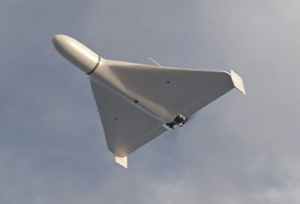Atri Corporation
This article is incomplete because it is pending further input from participants, or it is a work-in-progress by one author. Please comment on this article's talk page to share your input, comments and questions. Note: To contribute to this article, you may need to seek help from the author(s) of this page. |
| Atri Waziz | |
|---|---|
 A Waziz-1 in flight | |
| Type | Waziz-1: Loitering munition
|
| Place of origin | Charnea |
| Service history | |
| Used by | Charnean Army |
| Wars | September War Fahrani Civil War |
| Production history | |
| Designer | Mount Jekara Research Center |
| Manufacturer | Atri Industries |
| Specifications | |
| Engine | Piston engine |
Launch platform | Rocket-assisted take-off |
The Atri Waziz (Tamashek: ⵡⴰⵣⵉⵣ, tr. "Cicada") is a family of Charnean-made single-engine tactical unmanned aerial vehicles developed at the Charnean Army research and development facility at Mount Jekara and manufactured by Atri Industries at their Ekelhoc production plant. It was originally developed as a loitering munition but later spawned numerous air defense training, reconnaissance, and strike variants. The characteristics of each Waziz type varies depending on its role, although the entire family are considered low-technology drones and make ample use of commercially available civilian-grade components.
The Waziz is the most successful byproduct of the drone research and development program which began in 1971 at the Mount Jekara research facility. The Jekara program experimented with numerous designs throughout the course of the Ninvite War, refining the loitering munition concept which became widely accepted within the Charnean Army and beyond as a cost effective alternative to conventional guided munitions. The Waziz drones are the most successful implementation of Mount Jekara's drone concept, entering production in 2001 with the Waziz-1 loitering munition. The battlefield success of this simplistic and cheap drone design during the 2004 September War paved the way for further developments, namely the Waziz-2 which could serve as a recon drone as well as an air defense training target, and the more sophisticated Waziz-3 which is capable of carrying and deploying guided munitions including anti-tank guided missiles.
Atri Industries, the manufacturer of the Waziz, depends on sales of the drone for various military contracts to sustain itself financially. Waziz drones are extremely cheap to manufacture and have far larger profit margins for the company than the TEL series anti-armor guided munitions or its AEA series surface-to-air systems. The extensive use of cheap commercial parts in the design of the drone is cited as being mainly for cost cutting purposes, but is also believed to be motivated by the desire of the Charnean defense industry to make itself harder to affect with sanctions and embargoes. Their low price tag and operational simplicity also contributes to the volume of orders from the Charnean Army, which has begun to shift its doctrine to prefer drones for reconnaissance and light attack duties over manned aircraft in large part thanks to the Waziz.
Design
Waziz-1
The Waziz-1 established the basic design on which all Waziz drones would be based. It has a triangular shape with a cylindrical fuselage blended into a delta-wing with a wingspan of 2.5 meters. The steering apparatus consists of wing-tip rudders which double as stabilizers in flight. The central body is 3.5 meters including the rear-mounted pusher type propeller. The Waziz-1 notably lacks any cameras or transmission equipment and is designed to follow a pre-set flight path to its target. It is equipped with a satellite receiver and positioning equipment, however, enabling operators to remotely adjust its course in real time. The drone carries a 50kg warhead and enough fuel to fly for an exceptional 2000 kilometers, with a maximum speed of 190 kilometers per hour. The drone's construction utilizes primarily fiberglass and composite materials to reduce weight.
Waziz-2
Waziz-3
Launch system
All Waziz drone types are designed for a rocket-assisted deployment which requires very little infrastructure and equipment to carry out. The Waziz is fitted inside of a launch frame which is small enough for a converted ute to carry one or for a larger truck such as a Carryall to carry up to 5, allowing them to be launched in the field from mobile platforms in a similar manner to an MLRS. In order the launch, the frame must be tilted at a slight upward angle of about 30 degrees before the launch rocket ignites. The rocket quickly imparts the necessary flight speed and a favorable altitude before being jettisoned and the Waziz onboard propeller engaged to begin regular flight. The propeller is turned by a simple civilian-grade piston engine noted for its loud buzzing noise, which gives the drone its name.